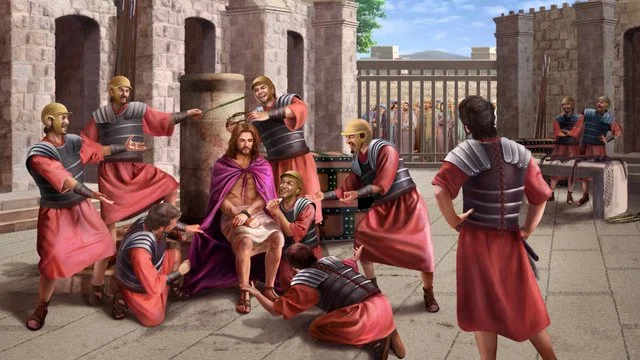Mark 15:16-32
In this week’s reading of the Gospel of Mark, Mark 15:16–32 describes the events leading up to and including the crucifixion of Jesus. This passage vividly portrays Jesus’ suffering, humiliation, and the fulfillment of prophecy. This passage invites reflection on Jesus’ endurance of suffering for humanity and His unwavering commitment to fulfilling God’s plan for salvation. It challenges us to see the depth of His sacrifice and respond with faith and gratitude. Here are the key points:
1. The Soldiers Mock Jesus (Verses 16–20)
Mockery of Kingship: The soldiers take Jesus into the palace (the Praetorium), gather the whole company, and mock Him as the "King of the Jews."
They dress Him in a purple robe (a symbol of royalty) and place a crown of thorns on His head.
They strike Him, spit on Him, and kneel in mock homage, sarcastically calling Him “King.”
Humiliation: After mocking Him, they remove the robe, put His clothes back on, and lead Him out to be crucified.
2. Simon of Cyrene Carries the Cross (Verse 21)
As Jesus is too weak to carry His cross after being scourged, the soldiers force Simon of Cyrene, who was passing by, to carry it for Him.
Significance: This moment reflects Jesus' humanity and the burden He bears for the sins of the world. Simon's role symbolizes discipleship—bearing the cross with Jesus (Mark 8:34).
3. Jesus is Crucified at Golgotha (Verses 22–25)
The Place of the Skull: Jesus is taken to Golgotha, meaning "Place of the Skull," where He is crucified.
Refusal of Wine Mixed with Myrrh: Jesus refuses a drink meant to numb the pain, choosing to fully endure His suffering.
The Act of Crucifixion: Jesus is nailed to the cross, and the soldiers divide His clothes by casting lots, fulfilling Psalm 22:18.
Timing: The crucifixion occurs at the third hour (9 a.m.).
4. The Inscription of the Charge (Verse 26)
Above Jesus’ head, the charge against Him reads, “The King of the Jews.”
Irony: While meant to mock, this title reflects the truth of Jesus' identity as King and the nature of His kingdom.
5. Jesus is Crucified Between Two Criminals (Verses 27–28)
Jesus is crucified alongside two robbers, one on His right and one on His left, fulfilling Isaiah 53:12: “He was numbered with the transgressors.”
6. Mocking and Derision (Verses 29–32)
By Passersby: People passing by hurl insults, challenging Jesus to save Himself and come down from the cross, echoing His earlier words about destroying and rebuilding the temple in three days.
By Religious Leaders: Chief priests and scribes mock Him, claiming He saved others but cannot save Himself, and sarcastically suggesting they will believe if He comes down from the cross.
By the Criminals: Even those crucified alongside Him insult Him.
The mockery of Jesus in Mark 15:16–32 reflects humanity's tendency to reject or diminish Jesus Christ, even when His identity and love are clear. In our daily lives, we may not verbally mock Jesus as the soldiers, crowd, or criminals did, but our actions, attitudes, and choices can sometimes reflect similar rejection. Whether it is living as though Jesus is not King or Lord of our lives—prioritizing our desires, ambitions, or societal expectations over His teachings or failing to love and serve others as Jesus commanded, especially the marginalized, oppressed, and needy (Matthew 25:40–45), we are crucifying Christ all over again.
The idea of "crucifying Christ again" comes from Hebrews 6:4–6, which says:
"It is impossible for those who have once been enlightened, who have tasted the heavenly gift, who have shared in the Holy Spirit, who have tasted the goodness of the word of God and the powers of the coming age, and who have fallen away, to be brought back to repentance. To their loss, they are crucifying the Son of God all over again and subjecting Him to public disgrace."
This passage has been interpreted in various ways throughout Christian history, but it primarily addresses the gravity of apostasy (falling away from the faith) and its implications. Apostasy is the act of abandoning, renouncing, or falling away from a previously held faith or belief system. In Christian terms, it specifically refers to someone who turns away from their faith in Jesus Christ after having professed belief in Him. Falling away from the faith and rejecting Christ publicly brings shame upon Him. In the Roman world, crucifixion was a humiliating punishment, and apostasy is likened to publicly agreeing with those who humiliated Christ.
Apostasy is a grave concern, but Scripture also assures us of God's power to preserve those who are truly His. Jude 1:24 reminds us:
"To Him who is able to keep you from stumbling and to present you before His glorious presence without fault and with great joy..."
Faithfulness to Christ requires vigilance, but His grace is sufficient to sustain us as we remain rooted in Him.
In God’s grip,
Pastor Chuck Church
If you are reading the Gospel of Mark with Pastor Chuck this year, below is a short and simple guide to doing so for this week:
Prayer: Heavenly Father, your words expose my innermost thoughts and desires. I am an open book before you when I read your book. May your truths work as I read of your holiness, truth, and love. May the power of your word be known in my life so that I might genuinely have the abundant life you came to give. Amen.
Read: Mark 15:16-32
Questions to guide your thinking:
1. How do I respond to Jesus’ kingship in my life?
In the passage, the soldiers mockingly call Jesus “King of the Jews,” failing to recognize His true authority.
Reflection: Do I honor Jesus as my King through my actions, decisions, and priorities, or do I sometimes disregard His authority over my life?
2. Am I willing to carry the cross with Jesus?
Simon of Cyrene is compelled to carry Jesus’ cross, symbolizing the call to discipleship (Mark 8:34).
Reflection: How do I respond when following Jesus requires sacrifice, discomfort, or enduring hardships? Am I willing to bear my “cross” in obedience to Him?
3. Do I mock or reject Jesus through my words or actions?
The soldiers, crowd, and criminals mock Jesus, questioning His identity and power.
Reflection: Are there ways in which my choices, attitudes, or words dishonor Jesus or fail to reflect my faith in Him?
4. Do I trust in God’s plan even when I face suffering or injustice?
Jesus endures mockery and the cross without retaliation, fully trusting in God’s redemptive plan.
Reflection: When I face pain, suffering, or unfair treatment, do I respond with faith and trust in God’s purpose, or do I allow bitterness or fear to take over?
5. How does Jesus’ sacrifice on the cross inspire gratitude and transformation in my life?
This passage vividly portrays Jesus’ willingness to endure unimaginable suffering for humanity’s sake.
Reflection: Does Jesus’ sacrifice lead me to live a life of gratitude, repentance, and obedience? How can I respond more fully to His love and grace?

